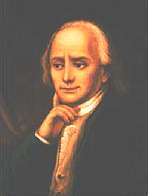Francis Lightfoot Lee
Francis Lightfoot Lee | |
|---|---|
 | |
| Delegate to the Continental Congress from Virginia | |
| In office 1774–1779 | |
| Member of the Virginia Senate | |
| In office 1778–1782 | |
| Personal details | |
| Born | October 14, 1734 Stratford Hall Plantation, Westmoreland County, Virginia Colony |
| Died | January 11, 1797 (aged 62) Menokin Plantation, Richmond County, Virginia |
| Resting place | Mount Airy, Tayloe Family Estate, Warsaw, Richmond County |
| Parent(s) | Thomas Lee Hannah Harrison Ludwell |
| Signature | |
Francis Lightfoot Lee (October 14, 1734 – January 11, 1797) was a Founding Father of the United States and a member of the House of Burgesses in the Colony of Virginia.[1] As an active protester regarding issues such as the Stamp Act of 1765, Lee helped move the colony in the direction of independence from Britain. Lee was a delegate to the Virginia Conventions and the Continental Congress. He was a signer of the Declaration of Independence and Articles of Confederation as a representative of Virginia. In addition to his career in politics, Lee owned a tobacco plantation as well as many slaves.[2] He was a member of the Lee family, a prominent Virginian dynasty.
Family, education and early life
[edit]
Lee was born on October 14, 1734, at Stratford Hall Plantation, in Westmoreland County, Virginia.[3] Lee was the fourth son of Thomas Lee and Hannah Harrison Ludwell. His middle name "Lightfoot" came from Francis Lightfoot, the best man at his father's wedding.[4] He was of English descent and was born into one of the First Families of Virginia. He grew up at Stratford Hall, a large tobacco plantation,[5] which his father completed in 1738. He was educated at home, where Lee pursued classical studies under Dr. Craig.
In 1772, Lee married his cousin, Rebecca Plater Tayloe. They were 2nd cousins, once removed. They had no children. Lee lived his entire life in the region of Virginia between the Rappahannock River and the Chesapeake Bay (known as the Northern Neck).
Lee was the grandson of Col. Richard Lee II and a great-grandson of Col. Richard Lee I. Senator Richard Henry Lee and diplomats William Lee and Dr. Arthur Lee were his brothers. Another brother, Thomas Ludwell Lee, was appointed to a committee, along with Thomas Jefferson, to re-write the laws of Virginia. His namesake Francis Lightfoot Lee II was the son of his brother Richard Henry Lee, and men of the same name descend from him.
Political career
[edit]In 1774, Lee was among those who called for a general congress and the first of the Virginia Conventions, which he attended. He served in the Virginia State Senate from 1778 to 1782 and was a delegate to the First Continental Congress held in Philadelphia, serving until 1779. As a congressional representative of Virginia, he signed both the Declaration of Independence and the Articles of Confederation. He was elected to the American Philosophical Society in 1768.[6] In 1793, he ran to represent Virginia's 19th congressional district in the U.S. House of Representatives.[7]
Death and legacy
[edit]Lee died of pleurisy at his residence (named "Menokin") in Richmond County, Virginia, on January 11, 1797, following his wife's death four days prior. He is buried in the Tayloe family burial ground at Mount Airy Plantation, near Warsaw, Virginia.[8]
The World War II Liberty Ship SS Francis L. Lee was named in his honor.
See also
[edit]References
[edit]- ^ Bernstein, Richard B. (2009). "Appendix: The Founding Fathers, A Partial List". The Founding Fathers Reconsidered. New York: Oxford University Press. pp. 176–180. ISBN 978-0199832576.
- ^ "Francis Lightfoot Lee". The Society of the Descendants of the Signers of the Declaration of Independence. Retrieved 6 July 2021.
- ^ Lee, Edmund J., ed. (1895). Lee of Virginia: 1642-1892. Philadelphia: Franklin Printing Company. p. 215. Retrieved 5 March 2022.
- ^ "Francis Lightfoot Lee". The Society of the Descendants of the Signers of the Declaration of Independence. Retrieved 6 July 2021.
- ^ "Francis Lightfoot Lee". The Society of the Descendants of the Signers of the Declaration of Independence. Retrieved 6 July 2021.
- ^ Bell, Whitfield J., and Charles Greifenstein, Jr. Patriot-Improvers: Biographical Sketches of Members of the American Philosophical Society. 3 vols. Philadelphia: American Philosophical Society, 1997, 3:616–620.
- ^ "A New Nation Votes". elections.lib.tufts.edu. Retrieved 2024-12-22.
- ^ "Stratford Hall". Archived from the original on 2020-03-19. Retrieved 2020-01-19.
Further reading
[edit]- Dill, Alonzo Thomas. Francis Lightfoot Lee, The Incomparable Signer. Edited by Edward M. Riley. Williamsburg: Virginia Independence Bicentennial Commission, 1977.
- Twain, Mark. "Francis Lightfoot Lee". Pennsylvania Magazine of History and Biography, I, no. 3 (1877). Reprinted in Charles Neider, ed., Mark Twain: Life as I Find It (New York, 1961).
External links
[edit]- United States Congress. "Francis Lightfoot Lee (id: L000190)". Biographical Directory of the United States Congress.
- Biography by Rev. Charles A. Goodrich, 1856 Archived 2006-09-01 at the Wayback Machine
- Francis Lightfoot Lee Bio
- Chisholm, Hugh, ed. (1911). . Encyclopædia Britannica (11th ed.). Cambridge University Press. This article on his brother also contains a paragraph on Francis Lightfoot Lee.
- 1734 births
- 1797 deaths
- Continental Congressmen from Virginia
- Signers of the Articles of Confederation
- Signers of the United States Declaration of Independence
- House of Burgesses members
- Virginia state senators
- Lee family (Virginia)
- American people of English descent
- American slave owners
- People from Westmoreland County, Virginia
- 18th-century American planters
- People from colonial Virginia
- Tayloe family (Virginia)
- People from Richmond County, Virginia
- Founding Fathers of the United States
- 18th-century members of the Virginia General Assembly
- Candidates in the 1793 United States elections
